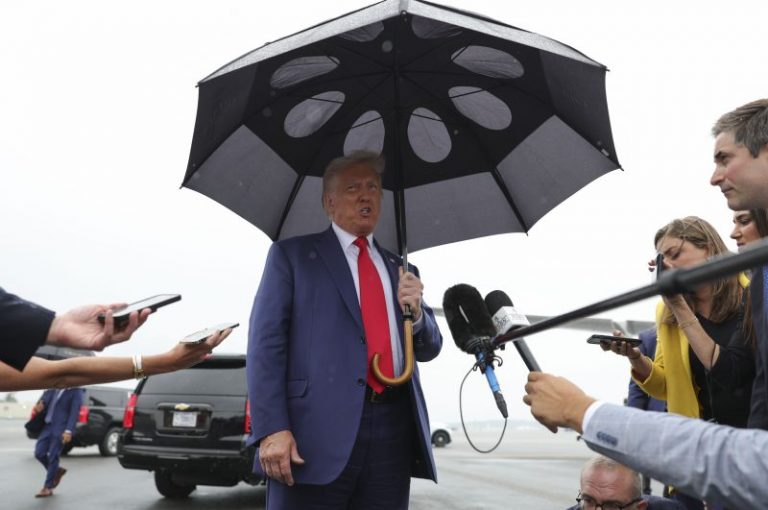Lawyers for former president Donald Trump asked a federal judge Tuesday to tap the brakes on prosecutors’ scheduled push later this week for a trial date in his criminal election interference case, as both sides dueled over Trump’s related resistance to agreeing to keep government evidence turned over in the case secret pending trial.
The chicken-and-egg legal wrangling has dominated proceedings since Trump was indicted Aug. 1 on four counts including conspiring to overturn the legitimate results of the 2020 presidential election, obstructing Congress’s confirmation of the vote and depriving Americans of the rights to have their votes counted.
The push-and-pull is expected to continue this week, with prosecutors on Thursday scheduled to propose a trial date and a hearing set for Friday to address potential limits on Trump’s disclosure of evidence in the case.
Trump pleaded not guilty Thursday, when U.S. Magistrate Judge Moxila A. Upadhyaya put all sides on notice that the trial judge in the case, U.S. District Judge Tanya S. Chutkan, intended to set a trial date on Aug. 28 after hearing from both sides.
That sparked an objection from Trump defense attorney John Lauro, who said Trump’s team could not estimate when or how long a trial might take before learning how much electronic and physical evidence — and what exculpatory evidence — might be in possession of the government.
“We need all that information, I think, in order to address the issue of when we would be ready,” Lauro said, adding pointedly, “We expect that this Court — we know this Court will give him the opportunity to address these issues pursuant to his due process rights and his rights under the Sixth Amendment.”
Lauro and co-counsel Todd Blanche made a more measured argument in writing on Tuesday, formally asking to extend by 25 days — from Trump’s Aug. 3 arraignment to Chutkan’s proposed Aug. 28 hearing — a 70-day deadline for trial established by law to protect defendants’ constitutional right to and the public’s interest in a speedy trial. The deadline can routinely be extended to manage complex or unusual government cases, address pretrial motions or respond to showing of good cause by a defendant, among other reasons, at a judge’s order.
“For a case of this magnitude, it would be impossible for the defense to evaluate the government’s evidence, prepare its own defense, and participate in pretrial proceedings, all within the time constraints of the Speedy Trial Act,” Blanche and Lauro wrote.
The lawyers said they anticipated needing to interview “hundreds of witnesses” and review terabytes of electronic evidence and hundreds of thousands of pages of documents and brief the court on “significant constitutional issues, and other novel questions of law and fact.”
The Latest Updates on Trump’s Trials
End of carousel
Chutkan gave special counsel Jack Smith’s office until Monday to respond, but Trump’s lawyers agreed to include the following statement by prosecutors: “The Government’s position is that the ends of justice are best served by a speedy trial. The Government will respond more specifically once it has the opportunity to review the defendant’s motion.”
Prosecutors and Trump’s team have separately battled over the government’s related push to turn over evidence in the case for the defense’s review, to speed both sides’ trial calculations. In fact, Assistant U.S. Attorney Thomas Windom said in court filings that the special counsel’s office has been seeking since the day after Trump’s indictment to reach agreement on a standard protective order to begin turning over “as soon as possible” evidence the defense said it wants to review.
Chutkan on Tuesday scheduled a separate hearing for Friday to settle that fight, which centers on whether permitting Trump to discuss the case could taint potential jurors or intimidate witnesses.
Prosecutors have said they are troubled by Trump’s history of posting on social media about “witnesses, judges, attorneys and others” associated with cases against him, including one that day that said: “IF YOU GO AFTER ME, I’M COMING AFTER YOU!” The government said Trump’s statements could have a “harmful chilling effect on witnesses,” proposing that he not disclose government-provided materials to anyone outside his legal team, potential witnesses, their lawyers or others approved by the court.
“The government is prepared, as soon as a protective order is entered in this case, to produce a substantial volume of discovery, including discovery that we are not obligated at this time to turn over,” Windom told the court last week. The point is to help Trump mount a defense in court, “not to wage a media campaign” or to feed prejudicial pretrial publicity, Windom added in a filing.
Trump’s lawyers have objected that such an approach is too broad and would violate the former president and 2024 Republican front-runner’s First Amendment rights, arguing that the protective order should shield only information clearly marked sensitive from public view, such as grand jury transcripts, sealed orders and search warrant materials.
For his part, Trump attacked Chutkan on social media Tuesday and mocked the idea that he would not talk about his criminal cases while campaigning in New Hampshire.
“I’ll come here and I’ll say, ‘Hi, everybody, listen, I’m not allowed to speak. Please vote for me, New Hampshire, if you would, bye,’” he said, adding, “I will talk about it. I will. They’re not taking away my First Amendment right.”

